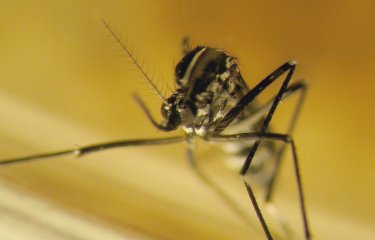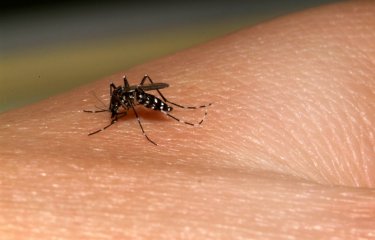In early May 2020, the French health authorities placed 58 of the country's départements on "red alert" in their map showing the spread of the tiger mosquito in France – seven more than in 2019. The Aedes albopictus mosquito, originally from Asia, has been present in France since 2004. It is the vector for diseases such as dengue, chikungunya and Zika.
The tiger mosquito (see What is the "tiger mosquito" (Aedes albopictus)?) can now be found in 58 French départements, according to the list compiled each year by the General Directorate of Health. The species is continuing to progress at lightning speed, with seven new départements placed on red alert this year: Charente, Cher, Loire-Atlantique, Yvelines, Haute-Savoie, Deux-Sèvres and Vienne join the 51 départements where the mosquito was already established and active (i.e. settled and breeding) in 2019. The départements are divided into two categories:
- lightly colonized départements, with less than 40% of towns and villages colonized by the mosquito;
- heavily colonized départements, with at least 40% of towns and villages colonized by the mosquito.
Percentage of municipalities colonized by Aedes albopictus, in the French départements (administrative divisions), in mainland France, on January 1, 2020.

The French départements where the tiger mosquito is present and active are classified as level 1 in the national plan to prevent the spread of chikungunya, dengue and Zika. To date, no level 1 départementhas returned to a lower level.
The tiger mosquito, with its characteristic black and white stripes, mainly lives in urban areas. Because of its anthropophilic nature, it is practically impossible to get rid of once it has arrived in a town or region.
See "What is the "tiger mosquito" (Aedes albopictus)?"
In 2019, mainland France saw its first cases of people contracting the Zika virus. Unlike "imported" cases of the disease, reported by people returning from a trip abroad, these individuals were infected following a mosquito bite in France (see Zika: indigenous cases for the first time in mainland France).
Anna-Bella Failloux, Head of the Arboviruses and Insect Vectors Unit at the Institut Pasteur, reminds us of some preventive measures that we can take to protect ourselves from insect bites: "Wear clothes that cover the body as much as possible and avoid being outside during peak mosquito biting hours."
In November 2019, research by her team, in collaboration with the Epidemiology of Emerging Diseases Unit (Arnaud Fontanet, Institut Pasteur), described the vector competence of Aedes albopictus from southern France for transmission of various Zika virus (ZIKV) genotypes. The scientists observed that the Aedes albopictus mosquitoes in France transmit African Zika better than Asian Zika.
Progression from 2004 to 2019

Source (in French): General Directorate of Health/French Ministry of Health
This study is part of the priority scientific area Emerging infectious diseases of the Institut Pasteur's strategic plan for 2019-2023.





